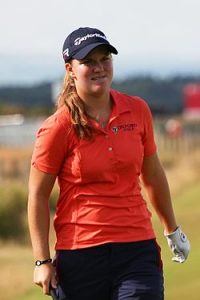TUESDAY, JANUARY 16, 2018

Pam Bowers has three times been honored by US Kids Golf as a Top 50 Instructor, and in 2012 she was presented the Top 50 Master Kids Teacher Award for her work with juniors. Pam teaches through the Bowers Golf Academy at Desert Willow Golf Club in Henderson, Nevada, outside Las Vegas. We asked her how to interest young players in the game and where to begin in teaching them.
Pam, how do you get kids interested in the game?
“There is definitely a window of influence that I have seen. We take kids as young as three. Personally, I started at three because my dad was a golfer. Once kids get to 12 or 13, depending on what else they’re involved in, it’s a little bit tough, but there are always ways to make that an opportunity as well. But I do think the younger, the better.
“It’s sharing the love of the game. When I was a kid, my dad would take me out to go putting. Our Christmas pictures were out on the putting green. It was something that he loved, so he really included us in that love. So it’s sharing the love. Individual players, as well as groups like your Links Players, can pass on the love. We’re starting a little foundation here at Desert Willow, and our men’s club started keeping a tip jar out after their outings and they give me the money in the jar to disperse it to families to pay for lessons. One family I work with has three kids and the youngest has brain cancer. The family wanted to make life normal for the other kids, so they would bring them out. But this little boy with brain cancer was sitting on the sidelines, so the men’s club paid for golf clubs for him, paid for all of his lessons, and they bought him a golf shirt so he could be in a junior golf program. You want to leave the legacy to your own children and invite them to play, but as groups you can really help out, and three of the guys from a Links Fellowship have really been instrumental in that.
“Some of the grandparents in our area, when their grandkids come to visit them, they have sought out lessons for their grandkids. They bring them down and now I have a relationship with these kids. Some are from San Francisco, some for Utah, some even back as far as Boston. So every time they come out, they know they get to go out and have golf lessons, they get go for rides in Grandpa’s cart. It’s been really fun to make the game inclusive in their own families but also to help out with the children in the community, too.”
How do I make sure I’m passing on my love and not just pressuring a kid to do something he or she doesn’t want to do?
“We have a lot of A personality guys at the golf course who have been tough with their own children, but they’re in a fresh relationship with their grandkids. I would recommend that any time there are around them, get them out to the golf course and go have fun. Take the kid for a ride in the cart and play a game of I Spy, seeing how many different animals you can find. This way they really get to enjoy things. And point out the things that you love—‘You know, I just enjoy the smell of the fresh grass. This is more fun for me than watching TV.’ It’s not ‘Hey, you go do this,’ but ‘This is what golf does for me.’ Younger kids really value what older people feel. Passing on a special golf club to them for their birthday is like, ‘Hey, I was thinking of you and I can’t wait for you to come visit next time. Here’s a putter. Maybe you could start practicing, and when you come down maybe we can go play some putting games at my golf course.’ It’s inviting them into their circle and their love.
“I encourage parents to put coins down. If the kid can make the putt from there, they win a quarter or whatever. Then they go in and get lunch at the club and you say, ‘Hey. Let’s sit out on the terrace.’ The more you share what you love, the more they will share it, and they will begin to look forward to it.”
What are the first couple of things I might want my junior to learn about the game?
“You know how we say that golf is a gentleman’s game. We ask kids what does it mean to be a gentleman? They’ll say manners and that kind of thing. Then we say, ‘Yeah, that’s one of the neat things about going out on the golf course is that it’s a sport where you learn to respect other people. So let’s go out onto the property with respect.’ So you preface it, ‘It’s not a playground. It’s not a park. When we get out there, we’re like guests and there are certain ways we behave, and I know you can do these things.’ They learn respect for the course. If you share with them that it’s exciting and a privilege, then their attention is very different. They learn that it’s not just about hitting the ball far, but it’s something super special.
“In learning the basics, there are two different schools of thought. Some people say, ‘I just want to give them a club and let them swing it.’ With the little, little kids I think it’s cool if they get them a plastic club and take them to the park and let them beat it all over the place. But as far as once they get on the golf course, you focus on the safety and the respect of the game.
“For me, the worst thing is when I work with kids whose parents or grandparents just let them whack it and the hands are in reverse. You let them swing it right-handed, but they have a left-hand low grip. That’s almost impossible to get them out of. I would recommend the 10-finger grip for kids under 10, but it’s got to be at least proper in that you have the correct hand on top.”


